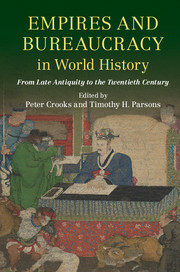Book contents
- Frontmatter
- Contents
- List of Figures
- List of Maps
- List of Tables
- List of Contributors
- Preface
- List of Abbreviations
- Part I Introduction
- Part II Empires and Bureaucracy in World-Historical Perspective
- Part III From Late Antiquity to the Middle Ages
- Part IV From the Age of European Expansion to the End of Empires
- 12 Magistrates to Administrators, Composite Monarchy to Fiscal-Military Empire: Empire and Bureaucracy in the Spanish Monarchy, c.1492–1825
- 13 Britain's Overseas Empire before 1780: Overwhelmingly Successful and Bureaucratically Challenged
- 14 ‘Les Enfants du Siècle’: An Empire of Young Professionals and the Creation of a Bureaucratic, Imperial Ethos in Napoleonic Europe
- 15 Bureaucracy, Power and Violence in Colonial India: The Role of Indian Subalterns
- 16 From Chief to Technocrat: Labour and Colonial Authority in Post–World War II Africa
- 17 The Unintended Consequences of Bureaucratic ‘Modernization’ in Post–World War II British Africa
- Part V Afterword
- Index
13 - Britain's Overseas Empire before 1780: Overwhelmingly Successful and Bureaucratically Challenged
from Part IV - From the Age of European Expansion to the End of Empires
Published online by Cambridge University Press: 05 August 2016
- Frontmatter
- Contents
- List of Figures
- List of Maps
- List of Tables
- List of Contributors
- Preface
- List of Abbreviations
- Part I Introduction
- Part II Empires and Bureaucracy in World-Historical Perspective
- Part III From Late Antiquity to the Middle Ages
- Part IV From the Age of European Expansion to the End of Empires
- 12 Magistrates to Administrators, Composite Monarchy to Fiscal-Military Empire: Empire and Bureaucracy in the Spanish Monarchy, c.1492–1825
- 13 Britain's Overseas Empire before 1780: Overwhelmingly Successful and Bureaucratically Challenged
- 14 ‘Les Enfants du Siècle’: An Empire of Young Professionals and the Creation of a Bureaucratic, Imperial Ethos in Napoleonic Europe
- 15 Bureaucracy, Power and Violence in Colonial India: The Role of Indian Subalterns
- 16 From Chief to Technocrat: Labour and Colonial Authority in Post–World War II Africa
- 17 The Unintended Consequences of Bureaucratic ‘Modernization’ in Post–World War II British Africa
- Part V Afterword
- Index
Summary
As a result of the American War for Independence, the British overseas empire in 1783 lost just under half of the thirty-three Atlantic colonies it had held when war began in 1775. In addition to the thirteen that became the United States, East and West Florida were retroceded to Spain and the French did not return Tobago, which they had captured during the war. Over the next half-century, the focus of empire shifted heavily to India, which until the 1760s had been a lucrative commercial venture presided over by a publicly chartered but privately controlled company with no significant territorial jurisdiction and little state oversight. Before 1783, however, the British empire had been primarily an Atlantic empire divided into thirty-four separate and self-contained polities, one in Ireland, eighteen in North America, eleven in the West Indies, three in the western Atlantic, and one in Africa. Formal political connections among these polities ran through London, and, except for the African colony of Senegambia, they were all settler colonies in the sense that settlers either constituted the overwhelming majority of the population or controlled most patented land and bound labour and dominated political and economic life. Indeed, settler demand for slaves accounted for the vast majority of British activities in Africa.
Formal political ties among its various parts in this sprawling polity ran through London, not laterally among overseas provinces. Although commercial exchanges and boundary issues often brought neighbouring polities together and colonies were generally free to trade with one another over long distances, they had no constitutional connection to one another. From very early on, the colonies had enjoyed considerable self-government; for most of the eighteenth century, various commentators spoke with pride on the fact that, as George Dempster put it in the British House of Commons in October 1775, Britain, in contrast to the ancient Roman and the modern Spanish, French, Dutch and Turkish empires, had, in the best British tradition, diffused ‘the blessings of liberty and good government … through our remotest provinces’. Yet, from the mid-seventeenth century, metropolitan authorities contested the extent of that liberty, making sporadic efforts to assert greater control over the colonies and provoking strong colonial resistance. The recurrent tensions over the extent to which British colonists might enjoy the traditional hallmarks of English liberty, specifically the right to consensual governance and the rule of law, were never resolved before the American revolution.
- Type
- Chapter
- Information
- Empires and Bureaucracy in World HistoryFrom Late Antiquity to the Twentieth Century, pp. 318 - 343Publisher: Cambridge University PressPrint publication year: 2016
- 1
- Cited by

